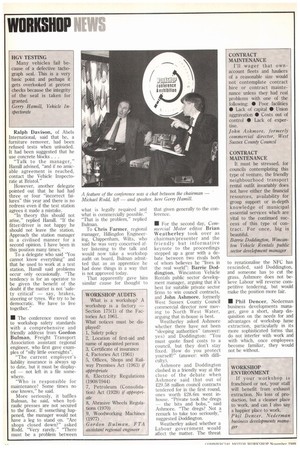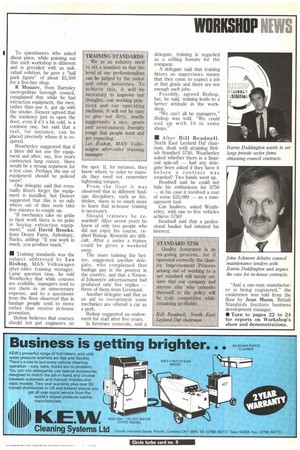WORKSHOP NEWS
Page 134

Page 135

If you've noticed an error in this article please click here to report it so we can fix it.
Ralph Davison, of Abets International, said that he, a furniture remover, had been refused tests when unloaded. It had been suggested that he use concrete blocks . . .
"Talk to the manager," Hang advised, "and if no amicable agreement is reached, contact the Vehicle Inspectorate at Bristol."
However, another delegate pointed out that he had had three or four "incorrect failures" this year and there is no redress even if the test station agrees it made a mistake.
"In theory this should not arise," replied Hamill. "If the fitter/driver is not happy he should not leave the station. Approach the station manager in a civilised manner for a second opinion. I have been in this position many times."
To a delegate who said "You cannot know everything" and that he used to work at a test station, Hamill said problems occur only occasionally. "The tendency is for an operator to be given the benefit of the doubt if the matter is not 'safety critical' — say, brakes, steering or tyres. We try to be democratic. We have to live together."
• The conference moved on to workshop safety standards with a comprehensive and friendly address from Gordon Hillman, Freight Transport Association assistant regional engineer, who first gave examples of "silly little oversights".
"The current employer's liability insurance is always up to date, but it must be displayed — not left in a file somewhere.
"Who is responsible for maintenance? Some times no one knows," he said.
More seriously, it baffles Bulman, he said, when hydraulic presses are not secured to the floor. If something happened, the manager would not have a leg to stand on, "Are shops closed down?" asked Rodd. "Very rarely." "There must be a problem between what is legally required and what is commercially possible." That is the problem," replied Bulman.
To Chris Farmer, regional manager, Hillingdon Engineering, Chippenham, Wilts, who said he was very concerned after listening to the talk and would now take a workshop audit on board, Bulman admitted that as an apprentice he had done things in a way that is not approved today.
That apparently gave him similar cause for thought to that given generally to the conference.
• For the second day, Commercial Motor editor Brian Weatherley took over as chairman/presenter and the friendly but informative keynote to the proceedings stepped up a gear with a debate between two rivals both of whom believes he "lives in the real world": Barrie Doddington, Wincanton Vehicle Rentals public sector development manager, arguing that it's best for suitable private sector firms to win council contracts, and John Ashmore, formerly West Sussex County Council commercial director now moving to North West Water, arguing that in-house is best.
Weatherley asked Ashmore whether there have not been "sleeping authorities" (answer: yes) and Doddington: "You must quote fixed costs to a council, but they don't stay fixed. How do you protect yourself?" (answer: with difficulty).
Ashmore and Doddington clashed in a friendly way at the close of the debate when Ashmore said that out of £29.58 million council contracts tendered for in the first round, ones worth £28.6m went inhouse. "Private took the dregs — the bits and bobs," said Ashmore. "The dregs? Not a remark to take too seriously," suggested Doddington.
Weatherley asked whether a Labour government would affect the matter. The threat to renationalise the NH.; has rescinded, said Doddington, and someone has to cut the grass. Ashmore does not believe Labour will reverse competitive tendering, but would make the position more fair, Phil Dencer, Nederman business developments manager, gave a short, sharp disquisition on the needs for and advantages of workshop fume extraction, particularly in its more sophisticated forms that do not interfer with work and with which, once employees become familiar, they would not be without. To questioners who asked about price, while pointing out that each workshop is different and is provided with an individual solution, he gave a "ball park figure" of about <£5,500 for a five-bay shop.
R Mouzev, from Barnsley metropolitan borough council, complained that while he had extraction equipment, the men, rather than use it, put up with the smoke. Dencer agreed that the tendency just to open the door, even if it's a bit cold, is a common one, but said that a reel, for instance, can be placed precisely where it is required.
Weatherley suggested that if a fitter did not use the equipment and after, say, five years contracted lung cancer, there would be a strong argument for a test case. Perhaps the use of equipment should be policed more?
One delegate said that eventually fitters forget the equipment is installed, but Dencer suggested that this is so only where out of date reels take five minutes to couple up.
"If mechanics take no pride in their work there is no point in buying extraction equipment," said David Brooks, from Deans Farm, Aylesbury, Bucks, adding: If you work in muck, you produce muck."
• Training standards was the subject addressed by Les Bishop, MAN Volkswagen after-sales training manager. Came question time, he told Weatherley that while courses are available, managers tend to see them as an unnecessary expense, and to a questioner from the floor observed that in haulage people tend to move rather than receive in-house promotion.
Bishop believes that courses should not put engineers on the spot. II, for instance, they know where to refer to manuals they need not remember tightening torques.
From the floor it was observed that in different haulage disciplines, such as his, timber, there is so much more to learn that in-house training is necessary.
Should trainees be rewarded? After seven years he knew of only two people who did not enjoy his course, replied Bishop. Rewards are difficult. After a series a trainee could be given a weekend away.
The more training the better, suggested another delegate, who complained that haulage pay is the poorest in the country, and that a National Jobcentre advertisement had produced only five replies — three of them from Liverpool.
Another delegate said that as an aid to recruitment some mechanics are offered a car as a perk.
Bishop suggested an endowment for staff after five years. In furniture removals, said a delegate, training is regarded as a selling feature for the company.
A delegate said that training fitters as supervisors means that they come to expect a job at that grade and there are not enough such jobs.
Possibly, agreed Bishop, but, he said, training leads to a better attitude in the workshop.
"We can't all be managers," Bishop was told. "We could end up with 10 in some shops."
• After Bill Beadnell, North East Leyland Dal chairman, dealt with attaining British Standard 5750, Weatherley asked whether there is a financial spin-off — had any delegate been asked if they have it before a contract was awarded? Two hands went up.
Beadnell said he could not hide his enthusiasm for 5750 — in his case it involved a cost of some £35,000 — as a management tool.
Can hauliers, asked Weatherley, with one to five vehicles achieve 5750?
Beadnell said that a professional haulier had initiated his interest.


























































































































































